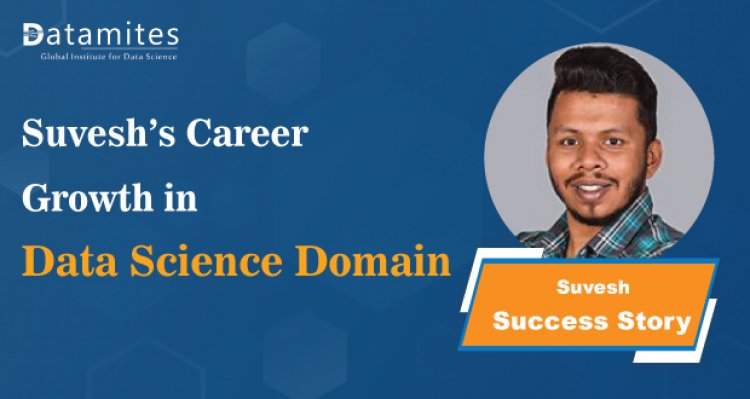Alumni Talks: Suvesh’s Career Growth in Data Science Domain

Picture yourself at the forefront of a technological explosion, right there in the role of a data scientist. What makes it even more intriguing? Witnessing the transition from an electrical engineer to a data science expert.
In this insightful “Alumni Talks” session, Suvesh, a Senior Associate Lead at Axtria, shares his experiences and perspectives on the dynamic field of data science. One particularly remarkable highlight of Suvesh’s journey is that he received not one, not two, but three data science job offers at once, a true testament to his skills and expertise in the field. His insights are sure to be both inspiring and informative for those looking to embark on a similar journey or seeking to advance their careers in this exciting and ever-evolving field.
1. Considering the prevalent misconception that data science is just a standard IT job, could you share your perspective on what makes data science truly fascinating?
In response to the question of whether I find data science interesting, I strongly disagree with the notion that data science is merely a conventional IT job. Data science is not only fascinating but also a field that is undergoing a significant transformation, often referred to as the “data science revolution.” It stands out as one of the most exciting and impactful career paths available today. Data scientists are not just IT professionals; they are often regarded as “decision scientists” because of their pivotal role in shaping the success of companies.
I currently work in the field of decision science at Axtria, where my responsibilities involve the analysis of data to derive actionable insights and make critical decisions. This work has a profound impact on our projects and clients. I deliberately chose Axtria, which specializes in life science and healthcare, to broaden my horizons in a domain where I had limited prior experience. Furthermore, the dynamic nature of this field keeps me engaged and motivated. Each day presents unique challenges, and every data science project is an opportunity to tackle new and exciting problems.
2. What were the initial challenges you encountered while working on projects at the start of your career?”
In the early stages of my career, I didn’t dive directly into building models and related tasks, mainly because I was relatively new to the field. Nevertheless, I did have experience in data cleaning and analysis, which forms the foundation of data science. One of my initial projects involved working with PNG, a retail and manufacturing business, where our objective was to develop models to gain insights into customer buying patterns.
This experience posed some significant challenges, yet it provided valuable learning opportunities. Collaborating with seasoned colleagues proved to be instrumental, as I absorbed essential lessons from real-world cases, steadily progressing toward excellence.
Refer these below articles:
- How to Become a Data Scientist in Bangalore?
- How to Become a Data Scientist in Pune?
- How to Become a Data Scientist in Hyderabad?
3. How was your transition from working in retail to the healthcare sector within the data science field?”
Moving from a retail-focused role to one centered on healthcare within the data science domain was a significant shift for me. I firmly believe that anyone who chooses to enter the data science industry, which is renowned for its challenges, is already embracing those challenges head-on. The beauty of data science is its universality; it’s omnipresent.
Whether we realize it or not, we interact with data every time we use our smartphones; it’s that fundamental. This universality means that the principles and processes of data science remain largely consistent across different industries. Hence, transitioning between industries within data science is quite feasible, with the underlying data science framework remaining constant.
4. Could you elaborate on the salary growth trends in data science?”
When I first ventured into the realm of data science, I had modest expectations regarding data science salary growth, initially anticipating a rate of at least 50 percent. However, to my pleasant surprise, I experienced an impressive 112 percent growth in my compensation. As I gained two years of valuable experience in the field, coupled with an intensive focus on research analytics and related areas, my current employer has offered a remarkable 300 percent hike.
In general, the data science domain boasts a substantial growth rate in terms of salaries, especially during the initial years. It’s not uncommon to witness an average growth rate of approximately 200 to 300 percent during this early phase of one’s data science career.
Read these below articles:
- Journey from Mechanical Engineering to Data Analyst
- Journey from Architect to Machine Learning Engineer – Raaja Vignesh
- A Journey from Fresher to Data Analyst
5. What’s your overall experience within the company, and how do you perceive your role as a data scientist?”
Reflecting back to my arrival in Bangalore in 2016, like many other engineers, I embarked on my career journey with skills in Java, CodeJava, and Testing, among others. To hone these skills further, I decided to enroll in a classroom training program, where I found myself among more than 400 fellow learners. In such a crowded and competitive landscape, I couldn’t help but wonder about my place in the industry and how I could truly stand out.
Fast forward to today, as a data scientist, I’ve witnessed a transformation in how I’m perceived within the company and the industry at large. The title itself carries significant weight, reflecting the evolving recognition of the critical role data scientists play. It’s clear that everyone is eager to step into the world of data science, a field that Forbes even hailed as the best job of the decade. This recognition underscores the growing importance and impact of data scientists in the professional landscape.
6. Is it difficult for individuals without an IT background to thrive in the field of data science?
In my personal perspective, I believe that many individuals grow weary of their daily routines, leading to job dissatisfaction. I experienced this firsthand as a testing engineer, where the repetitive and mechanical nature of the work became monotonous. In contrast, the role of a Data Scientist is marked by daily challenges and an ever-evolving landscape. This dynamism, coupled with the allure of competitive salaries, abundant opportunities, and the inherent value of the profession, reduces the likelihood of attrition.
Personally, I never entertained the thought of returning to my previous role; instead, I remained committed to continuous learning, whether it be designing data science architectures or engaging in domain research. This commitment has kept me firmly rooted in the field of data science, and I have never looked back.
7. How is the work life balance as a data scientist?
Maintaining work-life balance as a data scientist is quite manageable, primarily because our tasks are dynamic and not monotonous. My typical workday starts at 11 AM and extends until 8:30 PM. Currently, I’m also planning to write a white paper on image forensics, which involves a significant amount of research. However, I find that my deep interest in data science and the continuous knowledge I gain from it make it easier to balance work and personal life.
Outside of my professional commitments, I’m an avid traveler, a music enthusiast who has been playing the bass guitar for 11 years, and I enjoy cooking. Happily, I’ve been able to pursue these interests alongside my data science job, and I find that this balance enhances my overall satisfaction and well-being.
8. What advise would you give someone who is interested to learn data science?
For those eager to embark on the journey data science courses, here’s my advice: If you have a genuine passion for data science, or any field for that matter, don’t let that enthusiasm wane. Instead, keep that fire burning brightly and continuously strive to acquire new knowledge and data science skills.
Data science is indeed a challenging domain, but it’s also incredibly rewarding. In this pursuit, remember that failure is an integral part of the learning process; it’s the stepping stone to eventual success. Don’t be disheartened by setbacks; instead, view them as opportunities to grow and improve. Maintain your determination, stay curious, and take proactive steps to inch closer to your aspirations. With dedication and a thirst for knowledge, you’ll find that the taste of success in data science is all the sweeter for the journey it entails.
9. Which tool is being used in industry for data science programming?
In the data science industry, Python is the predominant programming language, accounting for about 95% of tool usage. Additionally, tools like Power BI and Tableau are commonly employed for data visualization. Databases such as MongoDB, SQL, and Azure SQL are crucial for data storage and retrieval, with cloud platforms like Microsoft Azure playing a key role in data management. R Shiny is used for creating interactive data dashboards and applications, though Python remains the primary tool of choice in data science.
10. Is it easier to transition from mechanical to data science?
Despite not having a mechanical background, I’d be happy to address this question. Transitioning from a non-coding background can indeed present challenges in understanding data science concepts, especially given the perception that data science is a complex field. However, my perspective is that any subject appears difficult until you gain familiarity with it; once you acquire knowledge, it becomes more manageable.
I’ve personally witnessed individuals with mechanical engineering backgrounds successfully applying data science within their areas of expertise. Me myself has transitioned from electrical engineering to data science and the key is a willingness to learn and adapt, which can open doors to exciting opportunities in data science, regardless of one’s initial background.
Watch the complete interview here
In this insightful “Alumni Talks” session, Suvesh, a Senior Associate Lead at Axtria, shared his experiences and perspectives on the dynamic field of data science. If you’re eager to embark on your own data science journey, consider exploring the offerings of DataMites. We provide comprehensive online data science training and also offer data science offline training in Bangalore and we also offer offline training sessions in major cities like Pune, Hyderabad, Mumbai, Nagpur, Delhi, Chennai and Ahmedabad. Many of these courses include IABAC certification, which can significantly enhance your professional credentials in the field. So, whether you’re starting from scratch or looking to advance your data science career, there are ample opportunities and resources available to help you succeed.

